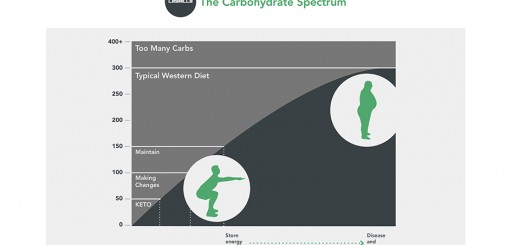 We are all biased in one way or another.
We are all biased in one way or another.
We tend to see the things we want to see and ignore the rest.
In the modern environment, this is necessary as we are constantly bombarded with all kinds of useless information.
We have learned to ignore things that are irrelevant to us, because otherwise we wouldn’t be able to get anything done.
In science, this becomes a major problem… and nowhere is it as apparent as in the field of nutrition.
People choose “sides” – then follow blogs and join groups of other people who have chosen the same “side.”
These blogs and groups like to share and discuss articles and information that reinforce the group’s beliefs.
When evidence that goes against the beliefs of the group shows up, people ignore it or attempt to explain why it is either flawed or invalid.
This is also known as group thinking:
“Groupthink is a psychological phenomenon that occurs within a group of people, in which the desire for harmony or conformity in the group results in an incorrect or deviant decision-making outcome.
Group members try to minimize conflict and reach a consensus decision without critical evaluation of alternative ideas or viewpoints, and by isolating themselves from outside influences.”
My articles often get linked to from vegan message boards. Sometimes I follow these links to see what they’re saying and this group thinking phenomenon is obvious in those places.
But I’ve been noticing this behavior a lot in low-carb/paleo groups as well and I REFUSE to be a part of it.
I do not write my articles to serve some agenda and I shudder at the thought of belonging to a group as biased as the most militant of vegans.
The Reason I Write so Much About Low-Carb Diets
I honestly believe low-carb diets to be a potential solution to some of the world’s biggest health problems.
These include all the problems related to the metabolic syndrome… obesity, diabetes, Alzheimer’s and even heart disease, plus many others.
These happen to be the biggest health problems in the world.
To treat most of these disorders, the authorities and most health professionals still recommend a calorie-restricted, low-fat diet.
The evidence is clear that this is a bad choice. These diets have been proven to be completely ineffective in large-scale randomized controlled trials that went on for years.
But there is another way… with tons of evidence behind it, that the authorities are still ignoring.
Over 20 randomized controlled trials show that the low-carb diet leads to much better outcomes than the low-fat diet… not just for weight loss, but a ton of important biomarkers and risk factors too.
In my opinion, there is no excuse for health organizations to continue to ignore these studies and peddle a failed low-fat diet that keeps people dependent on junk foods and drugs.
I think the message about low-carb diets as a treatment for these disorders isextremely important and I will continue to do my part in making people aware.
Low Carb Diets Are Not For Everyone
It is a big mistake to assume that there is one diet that is right for everyone.
What any one person should eat depends on a lot of things… age, gender, current health, activity levels, goals, environment, financial status, personal preferences, etc.
I don’t think most athletes should be eating a low-carb diet, especially not athletes that require glycogen in their muscles to do anaerobic work.
I also know plenty of people who have given low-carb an honest shot… but they didn’t fare well and gave up on it.
Then there are people who don’t want to eat low-carb, people who don’t feel gooddoing it and people who don’t need it.
We should be mindful of this and not bash other people for making choices that are different than ours.
Prevention vs. Cure
There is a lot of controversy regarding low-carb diets and it often seems like people aren’t even debating the same thing.
People seem to mix up the prevention and the cure… which do not have to be the same thing.
When someone’s metabolism breaks and they become insulin resistant, obese, diabetic, etc… things change.
The biochemical rules change and a person who has these problems may need a diet that is vastly different from someone who doesn’t have them.
Even though removing carbs can reverse some of these problems, it does not mean that removing carbs is necessary to prevent them from occurring in the first place.
I don’t think people who are metabolically healthy need to eat a low-carb diet. I think it’s completely unnecessary for these people.
To prevent this metabolic dysfunction from occurring in the first place, I think it’s enough to live a healthy lifestyle, exercise and avoid most processed foods, refined grains, trans fats and veggie oils.
There are so many populations in this world that have thrived as long as they ate real food… regardless of how many carbs they ate.
If you’re healthy and simply want to stay healthy, then just eat real food. In this case, the relative carbohydrate content of your diet is simply irrelevant.
This Close-Minded Attitude Must Change
I recently had an exchange with a few low-carbers about the subject of calories.
Some people were trying to make the case that calories were irrelevant when it came to weight loss. Irrelevant. I objected and got flamed by a bunch of people, including one medical doctor who is a low-carb blogger himself.
Calories are simply a measure of the energy contained in our foods. Of course the energy matters.
The energy content of the food we eat, vs. the energy content we expend… this is what determines whether we gain or lose fat (fat = stored energy).
It’s called the first law of thermodynamics and isn’t even debatable.
The reason low-carb diets work so well for weight loss is that they reduce appetite and cause an automatic restriction in calories (making calorie counting unnecessary, in many cases).
There is no metabolic magic at play that overrides the first law of thermodynamics. That is not possible and trying to maintain that position simply scares intelligent and educated people away.
Another recent exchange I had was about fruit. If you ask a few low-carb folks, fruits are nature’s poison. They have a bunch of fructose, raise your blood sugar sky high and everyone should be avoiding them.
This simply isn’t true. Fruits are also loaded with fiber, water and it takes a while to ingest them. It is almost impossible to overeat fructose by eating fruit (fruit juice is a different story).
The only reason I can see for avoiding fruit is if a person is either diabetic or actively trying to maintain a very low-carb ketogenic diet.
But that’s only a few percentages of the population… people should try to keep the other 90 something percent in mind before making blanket statements about real foods like fruit.
If we Behave This Way… Then We’re No Better Than The Vegans
At the end of the day, we must keep an open mind to other people and the choices they make.
The low-carb community as a whole must be more open minded and open to discussion. We shouldn’t let ourselves get blinded by our bias or else we’re no better than the vegans.
There is no one right way to eat and the sooner we accept that and stop bickering back and forth about the different approaches, the sooner we will make some actual progress for the good of everyone.
Original Article by: Kris Gunnars at AuthorityNutrition





